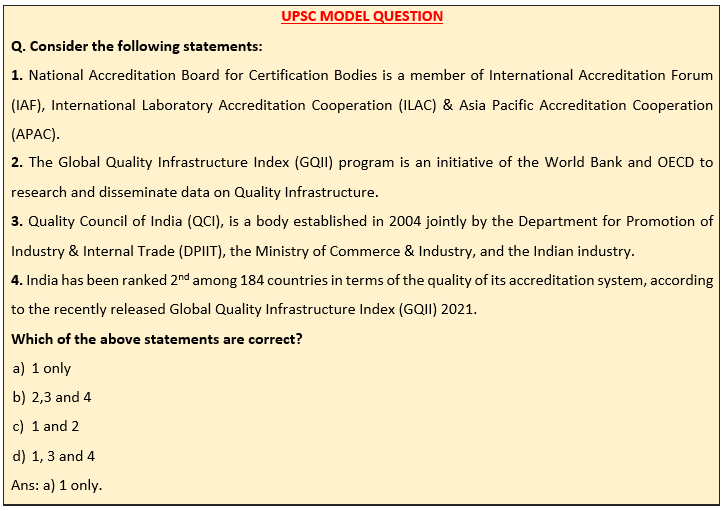Global Quality Infrastructure Index (GQII)
.jpg)
Disclaimer: Copyright infringement not intended.
Context:
- India’s National Accreditation System under the Quality Council of India (QCI) has been ranked 5th in the world in the recent Global Quality Infrastructure Index (GQII) 2021.
GQII:
- The GQII program is an initiative of the independent consulting firms Mesopartner and Analyticar to research and disseminate data on Quality Infrastructure.
- Here, Quality Infrastructure means the international system of metrology, standardization, accreditation and quality-related services (testing, calibration, inspection, verification, training and awareness building). All these creates confidence in international trade and contribute to the protection of consumers and the environment.
- The GQII is a database and ranking that allows interested persons to compare the quality infrastructure of different countries worldwide.
- The GQII ranks the 184 economies in the world on the basis of quality infrastructure (QI).
- The GQII rankings are published and presented post-facto for each year based on the data collected till the end of that year.
_1.png)
2021 GQI Rankings:
India
- India has been ranked fifth among 184 countries in terms of the quality of its accreditation system, according to the recently released Global Quality Infrastructure Index (GQII) 2021.
- India's overall QI system ranking continues to be tenth.
- Standardization system (under BIS) is ranked at 9th and the metrology system (under NPL-CSIR) at 21st position in the world.
- According to the index, India was ranked 21st in terms of metrology and ninth in standardization.
[Note: While QCI is the national body for accreditation, the Bureau of Indian Standards (BIS) is the main body for the formulation of standards, and the Council of Scientific and Industrial Research - National Physical Laboratory (CSIR–NPL) for the metrology system.]
World
- Germany topped the accreditation systems chart. It was followed by the US, China and Italy.
- The report said geographically, the top 25 are mainly located in Europe, North America, and Asia-Pacific, with some exceptions, such as India (10th), Brazil (13th), Australia (14th), and Turkey (16th).
Accreditation in India:
- Accreditation helps establish the competence and credibility of conformity assessment bodies (CABs) which perform testing, certification, inspection, etc.
- The National Accreditation System as per international standards in India is established by the Quality Council of India (QCI), a body established in 1997 jointly by the Department for Promotion of Industry & Internal Trade (DPIIT), Ministry of Commerce & Industry, and the Indian industry.
- QCI is operated through the constituent Boards of QCI, primarily the National Accreditation Board for Certification Bodies (NABCB), which provides accreditation to the certification, inspection, and validation / verification bodies, and the National Accreditation Board for Testing & Calibration Laboratories (NABL), which provides accreditation to the testing, calibration and medical laboratories.
- Both, NABCB and NABL are signatories to the Multilateral Recognition Arrangements of the international bodies, the International Accreditation Forum (IAF), and the International Laboratory Accreditation Cooperation (ILAC), which provides international equivalence and acceptance to reports and certificates issued under their accreditation.
- The government, regulators, industry and conformity assessment bodies increasingly rely on the NABCB and NABL accreditation for conformity assessment in India.
Significance of India’s rise in Accreditation System:
- The rise in India’s accreditation ranking is attributed to the steady growth of conformity assessment bodies (CABs) under national accreditation system.
- These are testing & medical labs, product certification bodies, and management systems certification bodies.
- India is on the path of self-reliance and we are no longer governed by other countries to innovate and improve. Our systems are being emulated by other countries now.
- The significance of our National Accreditation System in improving quality of products and services cannot be over-emphasised and this recognition will help us create a more independent ecosystem for regulators and government to use for conformity of any standard. Both our boards NABL and NABCB have worked well, and they need to be supported more.
Read about QCI: https://www.iasgyan.in/daily-current-affairs/quality-control-of-india
|
National Accreditation Board for Certification Bodies (NABCB) The National Accreditation Board for Certification Bodies provides accreditation to Certification, Inspection and Validation & Verification Bodies based on assessment of their competence as per the Board's criteria and in accordance with International Standards and Guidelines. NABCB is internationally recognized and represents the interests of the Indian industry at international forums through membership and active participation. NABCB is a member of International Accreditation Forum (IAF), International Laboratory Accreditation Cooperation (ILAC) & Asia Pacific Accreditation Cooperation (APAC) as well as signatory to their Multilateral Mutual Recognition Arrangements (MLAs / MRAs) for Quality Management Systems, Environmental Management Systems, Food Safety Management Systems, Information Security Management Systems, Energy Management Systems, Occupational Health & Safety Management Systems, Medical Devices Quality Management Systems, Product Certification, Global G.A.P., , Personnel Certification and Inspection. NABCB accreditations are internationally equivalent and facilitates global acceptance of certifications / inspections carried out by accredited bodies under NABCB accreditation. |
|
National Accreditation Board for Testing and Calibration Laboratories (NABL) NABL provides accreditation to Conformity Assessment Bodies (Laboratories) in India. NABL Schemes include Accreditation (Recognition) of Technical competence of testing, calibration, medical testing laboratories, Proficiency testing providers (PTP) & Reference Material Producers (RMP). It has Mutual Recognition Arrangement (MRA) with Asia Pacific Accreditation Cooperation (APAC), International Laboratory Accreditation Cooperation (ILAC). NABL is a constituent board of Quality Council of India which is an autonomous body setup under Department for Promotion of Industry and Internal Trade (DPIIT), Ministry of Commerce and Industry, Government of India. NABL provides accreditation in all major fields of Science and Engineering such as Biological, Chemical, Electrical, Electronics, Mechanical, Fluid-Flow, Non-Destructive, Photometry, Radiological, Thermal & Forensics disciplines under testing facilities and Electro-Technical, Mechanical, Fluid Flow, Thermal, Optical & Radiological disciplines under Calibration facilities. |




.jpeg)


1.png)
